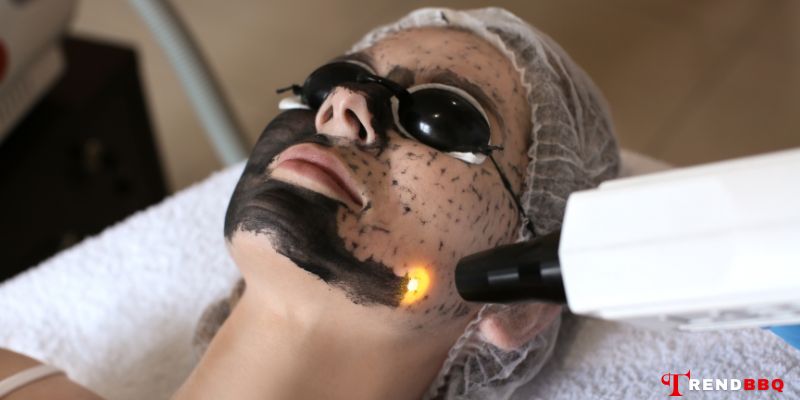Having smooth and clear skin is a goal for many, and one common concern that often arises is pore size. Larger pores can make the skin appear uneven and contribute to various skin issues. In this article, Trendbbq will delve into the science behind pore size and provide you with practical insights on how to shrink pores effectively, so you can achieve a radiant complexion you’ve always desired.
1. What Causes Large Pores?
Large pores are primarily caused by a combination of genetic factors, skin type, age, and environmental influences. Here are some of the main factors that contribute to the appearance of large pores:
- Genetics: Your genetic makeup plays a significant role in determining your skin’s characteristics, including pore size. If your parents have large pores, you are more likely to have them as well.
- Oily Skin: People with oily skin tend to have larger pores. Excess oil production can cause the pores to stretch and become more noticeable.
- Age: As you age, your skin’s elasticity and collagen production decrease. This can lead to a loss of firmness, causing pores to appear larger.
- Gender: Men generally have larger pores than women. This is due to differences in skin thickness and oil production.
- Hormones: Hormonal changes, such as those during puberty, pregnancy, and menstruation, can lead to increased oil production and larger pores.
- Sun Damage: Prolonged sun exposure can damage collagen and elastin fibers, causing the skin to lose its elasticity. This can make pores more prominent.
- Skin Care Routine: Incorrect or harsh skincare practices can irritate the skin and contribute to larger pores. For instance, using comedogenic products or over-cleansing can lead to irritation.
- Clogged Pores: When pores become clogged with excess oil, dead skin cells, and debris, they can stretch and appear larger.
- Blackheads and Whiteheads: Accumulation of sebum (oil) and dead skin cells can lead to the formation of blackheads and whiteheads, which can stretch pores and make them more visible.
- Acne: Inflammatory acne, such as cystic acne, can cause pores to stretch due to the inflammation and increased oil production associated with breakouts.
- Smoking: Smoking reduces blood flow to the skin and damages collagen and elastin, contributing to the appearance of larger pores.
- Environmental Factors: Exposure to pollution, dirt, and other environmental aggressors can contribute to clogged pores and enlarged appearance.
- Lack of Skincare: Inadequate skincare, such as not cleansing properly or neglecting to exfoliate, can result in the accumulation of debris in pores.
2. Can You Really Shrink Pores?
While it’s not possible to permanently reduce the size of your pores due to their genetic nature, you can take measures to diminish their visibility by maintaining their cleanliness from oil and impurities and enhancing your skin’s collagen and elastin production. These actions can also help in preventing pores from enlarging further.
It’s crucial to refrain from excessively squeezing your pores or employing extractor tools to unclog them, as doing so can lead to scarring and damage to the skin. According to Dr. Wu, using gentle products to clear out pores without causing additional harm is a better approach.
3. How to shrink pores
- Cleanse Regularly: Keeping your skin clean is the first step in pore care. Use a gentle cleanser to remove dirt, excess oil, and makeup. Avoid harsh cleansers, as they can strip your skin and exacerbate pore issues.
- Exfoliation: Regular exfoliation helps remove dead skin cells that can clog pores and make them appear larger. Opt for chemical exfoliants containing salicylic acid or glycolic acid, which penetrate the pores and promote a smoother complexion.
- Retinoids: Incorporating retinoid-based products into your skincare routine can help reduce pore size. Retinoids promote cell turnover, unclog pores, and improve skin texture over time.
- Hydration: Keeping your skin well-hydrated is crucial. Proper hydration plumps the skin, making pores appear smaller. Use a lightweight, non-comedogenic moisturizer to maintain balanced hydration.
- Sun Protection: UV rays can damage collagen and elastin fibers, causing pores to appear larger. Use a broad-spectrum sunscreen daily to protect your skin from sun damage and maintain skin elasticity.
- Clay Masks: Occasional use of clay masks can help draw out impurities, minimize oil production, and temporarily tighten the skin, reducing the appearance of pores.
- Professional Treatments: Dermatological treatments like chemical peels, microdermabrasion, and laser therapies can provide more intensive pore-shrinking results. Consult a skincare professional to determine the best option for your skin type.
Achieving smaller-looking pores involves a holistic approach to skincare that includes regular cleansing, exfoliation, hydration, and sun protection. While you can’t change your genetic predisposition, you can effectively manage pore appearance with a diligent routine and the right products. By following these tried-and-true practices on how to shrink pores, you’ll be on your way to smoother, healthier-looking skin that radiates confidence.
4. FAQs
Why do pores appear large, and can they really be shrunk?
Pores can appear larger due to genetics, age, skin type, and environmental factors. While you can’t permanently change pore size, you can minimize their appearance through various methods.
What skincare routine can help reduce the appearance of large pores?
Cleansing, exfoliating, and moisturizing regularly are essential. Use products containing salicylic acid, glycolic acid, or retinoids to help keep pores clear and minimize their appearance.
Can using a toner help shrink pores?
Some toners can temporarily tighten and minimize the appearance of pores. Look for toners with ingredients like witch hazel, niacinamide, or salicylic acid.
Can I use a pore-minimizing primer under makeup?
Yes, using a primer with pore-minimizing properties can help create a smoother surface and temporarily reduce the visibility of pores.
>>> See more: How to get rid of blackheads safely, effectively at home
